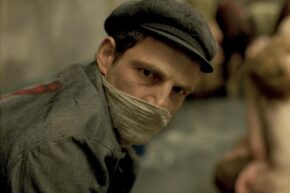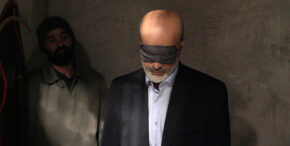Richard Porton
Donbass (Sergei Loznitsa, Germany/France/Netherlands/ Romania/Ukraine) — Contemporary World Cinema
By Richard Porton | 08/31/2018 | Cinema Scope Online, TIFF 2018
By Richard Porton At first glance, Sergei Loznitsa’s new film—unlike his previous, intricately plotted voyages to Hell such as My Joy and A Gentle Creature—seems like a scattershot series of vignettes, but eventually, Donbass’ near-Buñuelian episodic structure (in interviews, Loznitza cites The Phantom of Liberty as an influence) acquires a cumulative power. Adopting a superficially…
Read More → Son of Saul (László Nemes, Hungary)
By Richard Porton | 06/23/2015 | CS63, Festivals, From Cinema Scope Magazine, Spotlight
By Richard Porton Dennis Lim’s Artforum dispatch from Cannes pauses briefly to ponder the merits of László Nemes’ Son of Saul and concludes that, either despite or because of Nemes’ “showboating” tendencies, it’s a film that will “spawn a thousand think pieces.” If the ruminations that follow will, I’m afraid, constitute one of the first…
Read More → TIFF 2013 | Omar (Hany Abu-Assad, Palestine)—Special Presentation
By Richard Porton | 09/02/2013 | Cinema Scope Online, TIFF 2013
By Richard Porton While the Israeli-Palestinian quagmire has some inspired some distinguished non-fiction films since the dawn of the 21st century—notably Michel Khleifi and Eyal Sivan’s Route 181; Fragments of a Journey in Palestine-Israel, which remains one of the least seen important documentaries of the last decade—most features tackling this intractable conflict are disappointingly mediocre.…
Read More → TIFF 2013: Manuscripts Don’t Burn (Mohammad Rasoulof, Iran)—Contemporary World Cinema
By Richard Porton | 08/30/2013 | Cinema Scope Online, TIFF 2013
From Cinema Scope #55, Summer 2013 By Richard Porton By contrast to The Past, this year’s predominant Iranian Cannes entry, Mohammad Rasoulof’s Manuscripts Don’t Burn (which screened in Un Certain Regard and took home the FIPRESCI prize for that section), is not at all evasive when it comes to politics. Filmed clandestinely in Iran with…
Read More → TIFF 2013 | The Past (Asghar Farhadi, Frace/Italy)
By Richard Porton | 08/30/2013 | Cinema Scope Online, TIFF 2013
From Cinema Scope #55, Summer 2013 By Richard Porton For most critics, there’s an implied schism between conventional, “well-made” films and more challenging, supposedly obscure experimental or modernist cinema. A film such as Iranian director Asghar Farhadi’s The Past (a French production that was an entry in the Cannes Competition and won the best actress…
Read More → A Dangerous Method (David Cronenberg, Canada/Germany)
By Richard Porton | 09/28/2011 | CS48, From Cinema Scope Magazine, Spotlight
By Richard Porton The title of Russell Jacoby’s 1983 polemic, The Repression of Psychoanalysis, suggests that the radical implications of the Freudian tradition have become muddled in an era where nothing seems more safely middle-class than a session on the couch with the shrink of one’s choice. In evoking a juncture at the turn of…
Read More → Cannes 2011 | Melancholia (Lars von Trier, Denmark)
By Richard Porton | 06/28/2011 | CS47, Festivals, From Cinema Scope Magazine, Spotlight
By Richard Porton “The purpose of provocations is to get people to think,” declared Lars von Trier in Stig Björkman’s documentary Tranceformer—A Portrait of Lars von Trier (1997). By those standards, the provocation von Trier masterminded at the 2011 Cannes Film Festival, which, in reference to the concomitant Dominique Strauss-Kahn affair that monopolized the television…
Read More → Mildred Pierce’s Bitter Tears
By Richard Porton | 03/12/2011 | Columns, CS46, From Cinema Scope Magazine
By Richard Porton In “The Boys in the Back Room,” a famous essay written in 1940, Edmund Wilson damned James M. Cain’s work with faint praise by referring to the hard-boiled novelist as a “writer for the studios” whose “novels are produced in his off-time…they are a kind of Devil’s parody of the movies.” Yet…
Read More → Spotlight | Certified Copy (Abbas Kiarostami, France/Italy)
By Richard Porton | 06/18/2010 | CS43, From Cinema Scope Magazine, Spotlight
By Richard Porton The lukewarm critical reception accorded Abbas Kiarostami’s Cannes Competition entry, Certified Copy, can be attributed to several factors. Some critics appeared taken aback by Kiarostami’s recasting of some of the themes featured in sober, melancholy films such as Close-up (1990) and The Wind Will Carry Us (1999) in what doubtless appeared to…
Read More → Currency | Un prophète (Jacques Audiard, France)
By Richard Porton | 12/16/2009 | CS41, Currency, From Cinema Scope Magazine
For certain film critics, the encomium “well-made” has near-talismanic powers. While it would doubtless be condescending to damn a novel with faint praise by saying it’s, say, “well-structured,” a number of commentators seemingly believe that film craftsmanship today is so slipshod that merely acknowledging a basic level of competence adds up to a huge endorsement.…
Read More → Currency | The Lives of Others
By Richard Porton | 09/04/2009 | Currency
The Lives of Others (Florian Henckel von Donnersmarck, Germany) By Richard Porton As a sort of postmortem to the aborted East German workers’ uprising of 1953, Bertolt Brecht, despite his own cozy relationship with the regime, wrote a poem entitled The Solution that facetiously urged the State to “dissolve the people and elect another.” The…
Read More → Spotlight | Entre les murs (Laurent Cantet, France)
By Richard Porton | 09/01/2009 | From Cinema Scope Magazine, Spotlight
By Richard Porton Schoolroom films appeal to both mainstream and radical filmmakers because the setting often functions as a laboratory for—to use the current buzzword—change. Whether in fiercely independent films such as Jean Vigo’s Zéro de conduite (1933) or Hollywood boilerplate on the order of Blackboard Jungle (1955), or even Dangerous Minds (1995), classrooms invariably…
Read More → Currency | Happy-Go-Lucky
By Richard Porton | 08/31/2009 | Currency
Happy-Go-Lucky (Mike Leigh, UK) By Richard Porton Mike Leigh—celebrated playwright, filmmaker, and world-class blowhard—rarely misses an opportunity to pay homage to his own work. In the case of his latest film, Happy-Go-Lucky, he sums up his agenda as life affirming and “anti-miserablist”—a riposte to critics who consider him an avatar of British realist gloom. Audiences…
Read More → 









